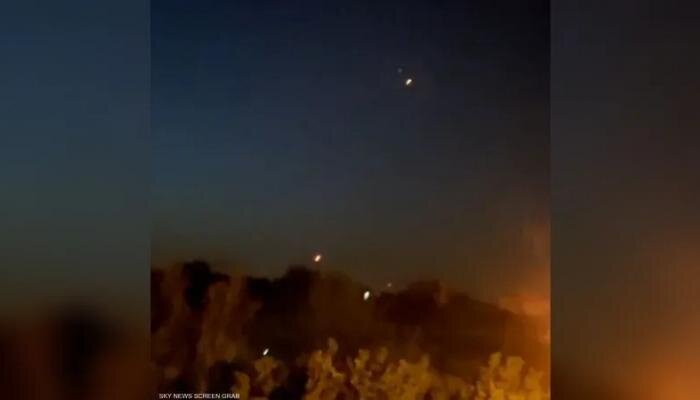By Mona Hojat Ansari
Israel carries out risky attack against Iran only to sink deeper into mud

TEHRAN - As Iranians began their day off on Friday morning, they were met with reports of an alleged Israeli assault on their nation's territory.
Videos taken by civilians depicted explosions in the sky just northwest of the central city of Esfahan. While Israeli media figures initially claimed on social media that the regime had executed "missile attacks" on "7 Iranian cities", the lack of substantial evidence of a successful assault, eventually forced them to retract their statements.
Official information remains scarce, leaving the public largely uninformed about the nature of the witnessed explosions. Iran's Army commander has confirmed that defense systems had downed "suspicious" objects, while most Israeli officials continue to remain notably silent. As of this writing, it is only evident that no explosions or material damage have occurred on the ground.
So far, the sole official attribution of the mysterious objects to Israel comes from unnamed American sources who informed the U.S. media of the regime's alleged attack on Iran. They added that an Army air base known as the 8th Tactical Air Base had been targeted.
What happened in Esfahan
Reports and analyses about the explosions are not fully unanimous. Almost all agree that Israel has carried out an unsuccessful attack against Iran as no damage was inflicted on Iranian sites. There are, however, different speculations about how the regime carried out the failed attack. Some believe only MAVs were involved, while others think the small projectiles were used as decoys to allow missiles fired by Israeli fighter jets from Iraq or Azerbaijan to hit targets inside Iran. Either way, the alleged missiles are thought to have been intercepted before making their way to the center of the country.
Israel’s deterrence is nowhere near restored
The sole Israeli official who seemed to respond to reports of an attack on Iran was the controversial minister Itamar Ben-Gvir, who appeared to criticize the regime's actions as useless.
"Scarecrow!" he posted on X, a few hours after initial reports of the alleged assault. However, other Israeli politicians did not take kindly to Ben Gvir's assessment.
Responding to Ben Gvir’s comment on X, a current member and former speaker of the Knesset called the minister’s social media post a sign of his “failure” at his job, while opposition Leader Yair Lapid said, “Never before has a minister done such a heavy damage” to Israel’s security.
It remains unclear whether Israeli politicians are upset with Ben Gvir for suggesting Israel's involvement in the attack or for characterizing it as weak. Nevertheless, it appears that officials throughout the regime's political spectrum are unhappy with Israel's response to Iran's significant attack on April 14.
Last week, Iran executed what has been described as "the largest attack against Israel" by launching a series of its older technology drones and missiles at the occupied territories. Despite all levels of Israel’s sophisticated defense shield being activated to counter the projectiles, several other states, including the U.S., UK, France, and Jordan, had to intervene to mitigate the impact of Iran's offensive. Ultimately, Tehran successfully struck its intended military targets in various parts of the occupied territories, including the heavily fortified Nevatim airbase, believed to be one of the most secure areas in the world.
"Western and Israeli media outlets are attempting to portray Israel's response as limited. I wholeheartedly disagree with that notion. Israel aimed to generate significant explosions and leverage them with support from its allies in the West. However, our robust defense capabilities thwarted their plans. This newfound success is poised to recalibrate power dynamics in the region," remarked Ali Abdi, an expert on Israel and Palestine.
Worse days to come for Israel
Regardless of whether Israel truly intended a restrained assault on Iran, the events in Esfahan underscore one undeniable reality: Israel can no longer act as recklessly as it has in the past.
"If we entertain the idea that Israel could have amplified its attack, its decision not to do so also underscores its profound weakness. The regime understands that any further provocation will trigger a much stronger response from Iran. They are still reeling from Operation True Promise. Israel now recognizes its extreme vulnerability vis-à-vis Iran, a reality it must come to terms with," asserted Strategic Affairs Expert Seyyed Reza Mir Taher in an interview with the Tehran Times.
"I believe they opted for a symbolic gesture to save face but ended up getting even more humiliated. Nothing on the scale of Iran's actions against Israel on April 14 has occurred before, not even during the 1973 Arab-Israeli War. This marks only the beginning of the end for Israel. The ten countries that aided Israel that night are also now aware that their bases could be targeted if Israel repeats its folly," he concluded.

No comments:
Post a Comment